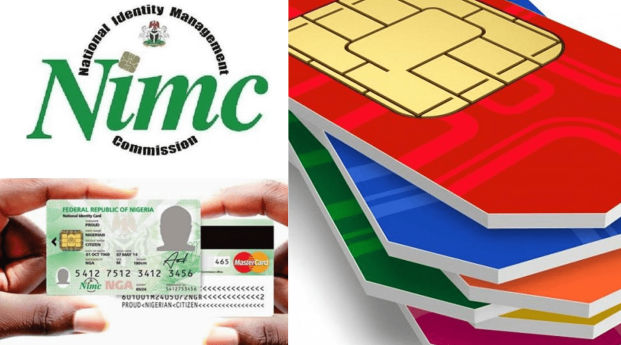Telecom
Mobile Subscriber Base drops by 30 Percent as SIM-NIN Policy Takes Effect

Nigeria’s mobile subscriber base fell 30.09 percent to 153.32 million in September 2024, following deactivation of Subscriber Identification Modules (SIMs) not linked to a verified National Identification Number (NIN) by the mandated deadline.

The SIM-NIN linkage initiative, aimed at enhancing security and identifying potential criminal elements, now requires that all SIM users have a verified NIN, with registration restricted to individuals over the age of 18. This move reinforces that SIM registration represents a legal contract, valid only for adults.
Earlier, the Nigerian Communications Commission (NCC), over 153 million SIMs have now been successfully linked to a NIN, achieving a compliance rate of 96 percent, up from 69.7 percent in January 2024.
In collaboration with the National Identity Management Commission (NIMC) and the Office of the National Security Adviser (ONSA), the NCC disclosed that it has discovered multiple cases of excessive SIM ownership, with some individuals reportedly holding over 100,000 SIM cards.
To maintain the integrity of Nigeria’s mobile network, the NCC emphasised its commitment to working with security agencies to eliminate the sale of pre-registered SIMs.
The NCC urged Nigerians who still need to complete their NIN-SIM linkage, or those with verification issues, to update their details promptly through service providers or approved self-service portals. It also reiterated that the sale or purchase of pre-registered SIMs is illegal and encouraged the public to report any such incidents via its toll-free line, 622, or through its social media channels.
Telecom
USSD Dispute: FG May Blacklist 18 Banks Allegedly Owing Telcos N250Bn

Indications have emerged that federal government may this week list names of 18 banks owing almost N250 billion naira to Nigerian telecom operators on Unstructured Supplementary Service Data (USSD), and have remained adamant towards settling it for several years.

Nigerian Communications Commission (NCC) has reportedly been given the nod to publish the names and approve that telcos withdraw services to them if after two weeks they fail to settle the debts, according to Vangaurd.
Recall that the issue of banks’ multi billionnaira USSD debt to telcos has lingered since 2020, rising from below N40 billion to N57 billion by the end of 2021 and N80 billion in 2022.
But now, the telcos claim the debt has risen above N250 billion and accused the banks of not complying with the repayment plan.
The recent development, cannot be unconnected with a December joint meeting between the two regulators, NCC and the Central Bank of Nigeria (CBN) which resolved that the banks pay part of the money by December 31, last year and defray the remaining gradually.
However, Vanguard gathered authoritatively that only four banks complied with the directive, while 18 others are still adamant.
Similarly, when the matter brewed heavily a few years ago, the National Assembly, Central Bank of Nigeria, CBN, and the Nigerian Communications Commission, waded in and also generated such a gentleman’s agreement, which gave the banks leverage to defray the debts gradually.
However, that did not also happen as the banks allegedly reneged.
A few weeks ago Gbenga Adebayo, chairman, Association of Licensed Telecommunications Operators of Nigeria (ALTON), accused the banks of deliberately frustrating any move to resolve the issue and threatened that the only option, since the banks have consistently failed to honour the agreements, would be to withdraw the support that gives the USSD platform life.
Telecom
Suspected Lakurawa Terrorists Kill 3 Telcoms Workers in Kebbi

Terrorists belonging to Lakurawa group have reportedly killed three staff of a leading telecommunication firm.

The insurgents were said to have invaded a construction site at Gumki village in Arewa Local Government Area of Kebbi State.
The bandits reportedly attacked a construction site at Gumki village in Arewa Local Government Area of Kebbi State when their victims were installing a surveillance mast for the Nigeria Immigration Service and killed them and one other person who is yet to be identified.
There was a conflicting report of which organization the victims belonged as the police said three of the deceased were Airtel staff and the residents identified them to be Immigration staff.
A staff of Sir Yahaya Specialist Hospital however corroborated the villagers, saying the three victims brought to the hospital were Immigration staff.
But SP Nafiu Abubakar, police spokesperson, said four persons lost their lives, one indigene and three staff of Airtel.
He said from the report the police got, Bello M Sani, state Commissioner of Police, alongside with CIS Muhammad Bashir, Comptroller, Nigeria Immigration Service, Kebbi State Command, Lawali mobilized their men to the scene to evacuate the corpses to Sir Yahaya Memorial Hospital in Birnin Kebbi.
He said his CP has deployed additional tactical teams to the area and charged them to decisively deal with the suspected bandits operating in the area.
He said the CP also had meeting with people in the area and appealed to them to always assist the police and other security agencies with relevant information for their prompt response.
Telecom
Nigeria Has World’s Most Affordable Data Costs – GSMA

Nigeria has an average data cost of $0.38 per gigabyte, making her the most affordable countries globally and one of the cheapest in Africa for mobile data services.

United States averages $6 per gigabyte and South Africa with $1.77 per gigabyte rank the highest globally and in Africa respectively.
According to the GSMA, Nigerian data costs, as a percentage of Gross National Income (GNI) per capita, are among the lowest across Africa.
The reports by the body lends weight to telecom operators advocacy for tariff adjustments to address economic pressures threatening the sector’s sustainability.
The GSMA report, titled “The Role of Mobile Technology in Driving the Digital Economy in Nigeria,” highlighted Nigeria’s competitive data pricing, which is significantly lower than other African nations, such as Kenya ($0.59 per gigabyte), Ethiopia ($0.68 per gigabyte), and South Africa ($1.77 per gigabyte).
By contrast, the United States averages $6 per gigabyte, underscoring Nigeria’s advantage in offering cost-effective connectivity.
The cost of mobile data in Africa varies greatly by country and region.
Data costs can refer to the cost of mobile data or the cost of acquiring, maintaining, and using business data.
In 2023, the average cost of 1 GB of mobile data in Sub-Saharan Africa was $3.31, while in Northern Africa it was $0.86.
Telecommunications operators in Nigeria have been requesting some policy changes as well as tariff rebalancing to enable them deliver support to the Government’s digital economy objectives.
They have called for the simplification and improvement of the Right of Way (RoW) charging and administration process, harmonised across the country
According to them, all government authorities (at national and sub-national levels) should apply the national maximum RoW fee of N145 per/LSQM adopted by the National Economic Council (NEC) for the deployment of fibre across all states in Nigeria.
There should be a single point of contact in each state for the RoW application process while the duration for the approval process should be digitalised and limited to a maximum of one month.
Simplification and reduction of the tax burden on the mobile sector
On tariff, recall that the Association of Licensed Telecommunications Operators of Nigeria (ALTON) and the Association of Telecommunications Companies of Nigeria (ATCON) had urged the Nigerian Communications Commission (NCC) to consider reviewing tariffs upward to address rising operational costs.
Nodding in agreement, Bismarck Rewane, chief executive officer, Financial Derivatives, said the proposed tariff hike by telecommunications will help reduce inflation in the country.
He said it would help to reduce inflation because it increases productivity, stressing that the price of MTN shares went up by 10% to 220.
Rewane reiterated that investors had already factored that in, adding that they are expecting a lot of good goodies.
“But more important to think about is the fact that because of an increase in tariff and an increase in investment to make the industry sustainable, they’re going to see an increase in productivity, not directly but indirectly.
“Any increase in productivity and output is likely to allow inflation to moderate, which is the goal. So, we heard from the policymaker, Bosun Tijani, who was very clear that we want a sustainable sector. But we also heard from the regulator saying that we will hold these guys to quality of service.
“We also heard from the operators, MTN that they are all revving up. So in all, there are economic benefits because of increased output and productivity. Two, policymakers are aligned because they want this to lead to a moderation in inflation,” he added.
He further said that it was not a bad deal and re-echoed the minister’s comment that the tariff hike will not be 100 per cent.
“Will they get 100%? No, they will definitely not. We suspect that we are going to likely see something between 40 and 50% which is fair after so many years of static changes,” Rewane added.

 Telecom1 day ago
Telecom1 day agoSuspected Lakurawa Terrorists Kill 3 Telcoms Workers in Kebbi

 E-Financial1 day ago
E-Financial1 day agoBudgIT Queries Irregularities in FG’s Proposed 2025 Budget

 General News1 day ago
General News1 day agoLagos State Sets Strict Deadline for 2024 Tax Returns Filing

 News1 day ago
News1 day agoSERAP Drags FG, Govs to ECOWAS Court over ‘Misuse of Cybercrimes Act’

 E-Financial1 day ago
E-Financial1 day agoNAICOM Seeks Police’s Support to Enforce Third-party Motor Insurance

 E-Financial1 day ago
E-Financial1 day agoGAIM 6: Fidelity Bank Rewards 10 Customers with N10m

 E-Business1 day ago
E-Business1 day agoLagos, NIPOST Partner to Transform e-Commerce Delivery

 News1 day ago
News1 day agoGOCOP Applauds Edo Gov for Appointing Edomaruse, SA, Int’l Development


























